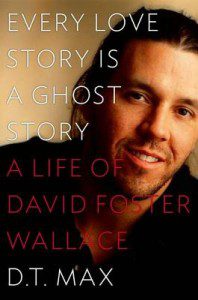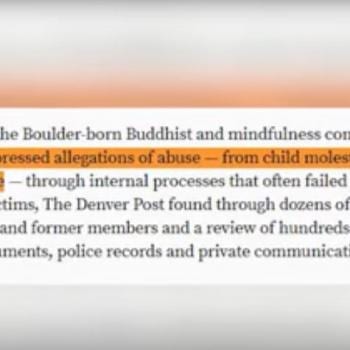The commencement address that David Foster Wallace gave in 2005 at Kenyon College has just been re-posted on youtube with a little visual help from filmmakers known as The Glossary. As the filmmakers state, “the resulting speech didn’t become widely known until 3 years later, after his tragic death. It is, without a doubt, some of the best life advice we’ve ever come across, and perhaps the most simple and elegant explanation of the real value of education.” After 3 days it has over 1.5 million hits. After 4 days it has over 2.5 million hits.
See why:
http://www.youtube.com/watch?v=xmpYnxlEh0c&The text (in part):
There are these two young fish swimming along and they happen to meet an older fish swimming the other way, who nods at them and says “Morning, boys. How’s the water?” And the two young fish swim on for a bit, and then eventually one of them looks over at the other and goes “What the hell is water?”
…
The point of the fish story is merely that the most obvious, important realities are often the ones that are hardest to see and talk about. Stated as an English sentence, of course, this is just a banal platitude, but the fact is that in the day to day trenches of adult existence, banal platitudes can have a life or death importance, or so I wish to suggest to you on this dry and lovely morning.
…
[skipping to the end]
…
That is real freedom. That is being educated, and understanding how to think. The alternative is unconsciousness, the default setting, the rat race, the constant gnawing sense of having had, and lost, some infinite thing.
I know that this stuff probably doesn’t sound fun and breezy or grandly inspirational the way a commencement speech is supposed to sound. What it is, as far as I can see, is the capital-T Truth, with a whole lot of rhetorical niceties stripped away. You are, of course, free to think of it whatever you wish. But please don’t just dismiss it as just some finger-wagging Dr. Laura sermon. None of this stuff is really about morality or religion or dogma or big fancy questions of life after death.
The capital-T Truth is about life BEFORE death.
It is about the real value of a real education, which has almost nothing to do with knowledge, and everything to do with simple awareness; awareness of what is so real and essential, so hidden in plain sight all around us, all the time, that we have to keep reminding ourselves over and over:
“This is water.”
“This is water.”
The original speech (the above is an abridged version) made its way in to a book of the same title: This is Water:Some Thoughts, Delivered on a Significant Occasion, about Living a Compassionate Life.
~

After his death in 2008, many wondered about his religious beliefs. As Eric Been writes for the Atlantic (in an interview with D.T. Max, author of a biography of Wallace published last year):
One part of the book I found striking is when you discuss how he developed an interest in Buddhism, but as you write, it was always hard for him to “understand that Buddhism wasn’t a course you tried to ace.” He seemed to have the same issues when it came to Christianity.
I think some people have tried to turn David into some kind of Thomas Merton figure, but whereas Merton found God, David found God in the form of a 12-step program. Part of the 12-step program that he found hardest to accept—and therefore in my mind most exciting to think about—was faith. I don’t think the Judeo-Christian God ever satisfied him. I think he found it hard to put his skepticism away and feel faith.
Wallace’s descriptions of the world, both the samsaric suffering, and the way to its end, seem to resonate clearly with many Buddhists today. As Sam Mowe wrote for Tricycle, “Awareness. Compassion. Freedom. While this speech is probably considered the most “Buddhist” of Wallace’s work (his “This is water” bit at its conclusion might as well have come straight from Dogen’s mouth)…” And, “Wallace must have meditated. Those physical descriptions—insects crawling over the body and shooting out of the head—are just too real for him to not have. Indeed, many of Wallace’s characters seem aware—hyper-aware—of the samsaric nature of their minds.”
Josh Korda of DarmaPunx NYC likewise took an opportunity to meditate on the words of David Foster Wallace [DFW],
While what the buddha calls “our run of the mill mind” or DFW “default self-centered settings” is a profoundly distorted and stress inducing creation, it nevertheless stays intact because, after all, it is the way things “appear to be”
—DFW starts off his talk with the story about fish that don’t know what water is
—the appearance that the sun revolves around the earth
—most of [us] live our lives without questioning all of our thoughts, views, opinions, not realizing that, as they are filtered through the prism of self, they are likely to be delusional
But Ryan Zee of blogcritics seems to have the best analysis of a possible (and indeed likely) influence from Buddhism on Wallace – either directly or indirectly. After discussing the overlap between Wallace’s speech and Eckhart Tolle’s book, The Power of Now, Zee concludes:
I don’t mean to suggest that Tolle’s book itself influenced Wallace or his speech. (Although the fact that they both use a fish metaphor at one point to characterize an absence of consciousness is definitely odd.) Buddhism seems a much more likely common influence. I’ve already mentioned Tolle’s interest in Buddhism, but as D.T. Max made clear in his recent biography, Wallace also became enamored with Buddhist philosophy later in life. Future studies of Wallace’s work might find Buddhist philosophy an unlikely source of insight.
And yet, as Wallace himself said, this isn’t about religion, it’s about the capital T-Truth we are seeking in this life – so perhaps those interested in Buddhism or Buddhist philosophy because of how it seems to speak clearly about the human condition should be asking themselves not only how Buddhism might have shaped Wallace, but also how Wallace’s ideas and insights might help to better shape Buddhism – and non-Buddhism – in the future.











